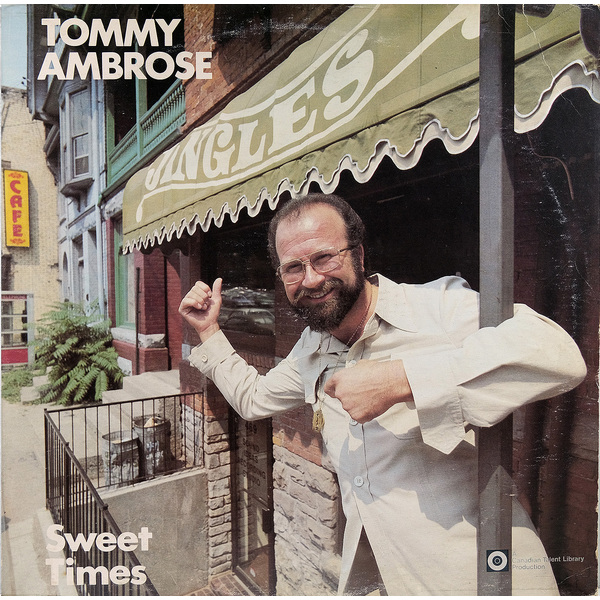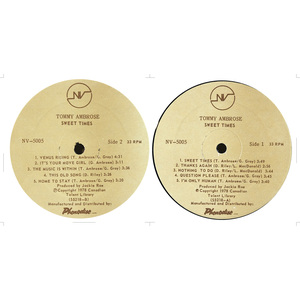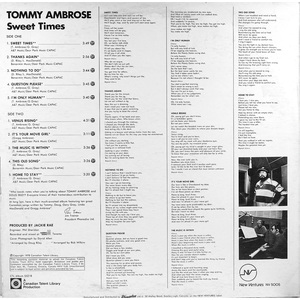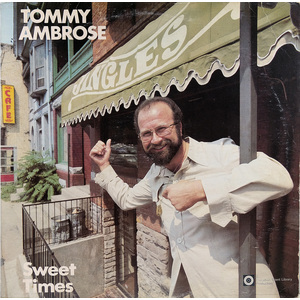Information/Write-up
Tommy Ambrose: Canada's Velvet Voice of Soulful Pop
Tommy Ambrose was born in Toronto in 1939 and found his voice in the church before he ever stepped into a studio. By the age of five, he was singing gospel music at large-scale “Youth for Christ” rallies at Massey Hall and Maple Leaf Gardens under the guidance of preacher and broadcaster Charles Templeton. By his early teens, Ambrose was already a seasoned performer, appearing regularly on gospel radio broadcasts for Toronto’s CFRB and CKEY.
His pivot to popular music in the late 1950s marked the beginning of one of Canada’s most versatile and enduring careers in entertainment. At just 20, Ambrose was chosen as the star and central figure of CBC’s nationally broadcast While We’re Young, a television variety show aimed at introducing a younger generation of performers to a country in transition. With his warm vocal delivery and stage presence, he proved to be the “pivot” the network was searching for, anchoring the show through its inaugural run in 1960.
Soon after, Ambrose recorded his debut album, Young Tommy Ambrose, with producer Art Snider for the Chateau label. Backed by a stellar jazz ensemble led by Don Thompson and featuring Rob McConnell, Wray Downes, and Archie Alleyne, the record revealed a singer of uncommon poise and soul. Though trained in gospel, Ambrose’s phrasing drew comparisons to Tony Bennett and Ray Charles—yet his sound was always his own: clean, emotive, and naturally tuned to melody. His early singles for Sparton and Chateau, including “The Magic of You” and “I Need Your Love,” earned national airplay and showcased his command of both jazz ballads and swinging pop.
Throughout the 1960s, Ambrose became a fixture on Canadian television, appearing on Cross-Canada Hit Parade, hosting his own series The Tommy Ambrose Show, and performing alongside the country’s top orchestras. A brief move to New York in the mid-1960s brought new opportunities in the world of commercial music. Working with producer Phil Ramone and composer-arranger Patrick Williams, Ambrose became a sought-after studio vocalist, honing his craft in the city’s competitive jingle scene.
Returning to Toronto by the end of the decade, Ambrose co-founded Trudel Productions with Larry Trudel and later launched PC Productions. He quickly became one of Canada’s most prolific creators of commercial music. His voice—and often his pen—became familiar to millions: “Blue Smiles Along with You” for Labatt Blue, “Wear a Mustache” for Milk, “Get Crackin’” for Canada’s egg farmers, “There Are No Strangers” for CTV’s Olympic coverage, and the classic Smarties jingle, “When You Eat Your Smarties, Do You Eat the Red Ones Last?”
In 1971, Ambrose recorded the single Just Like a Man b/w That’s the Way It Was for CBC Radio Canada (LM 106). Produced by Dave Bird and engineered by Ian Jacobson at Studio 4-Sound in Toronto, it was released as part of CBC’s LM series of broadcast-only promotional 45s.
In 1972, he released People City, a theme song co-written with Gary Gray and arranged by Norm Amadio, which became the musical identity of Toronto’s CITY-TV. The single reached #44 on Canadian charts and became one of his best-known works.
During the 1970s and early 1980s, Ambrose returned to the stage and the studio with a renewed sense of artistic direction. His musical partnership with Doug Riley resulted in two albums for the Canadian Talent Library: Sweet Times (1977) and At Last (1979). Both records blended adult-pop songwriting with soul-jazz arrangements, offering a mature, emotionally honest sound. Tracks like “I’m Only Human,” “Home to Stay,” and “The Music Is Within” reflected his continued evolution as a singer and lyricist.
Ambrose also founded Jingles, a downtown Toronto jazz club where he performed regularly with Riley’s nine-piece band. It became a key venue in the local scene throughout the late 1970s and early ’80s.
In 1974, Ambrose began hosting the CBC gospel series Celebration, reconnecting with his spiritual roots. He later fronted Tommy Ambrose and Friends, a televised variety show featuring a 35-piece orchestra and guests such as Jack Sheldon, James Moody, and Sue Raney.
In the 1990s, after relocating to Niagara-on-the-Lake, Ambrose collaborated with writer Frank Peppiatt to develop Songs Sinatra Taught Me, a theatrical show built around selections from the American songbook. He performed it in theatres across Ontario and later released a CD version.
Even in his later years, Ambrose remained active—writing, recording, and occasionally performing. Whether in the studio, on stage, or behind the scenes, his voice and musical instincts stayed sharp. He moved comfortably between gospel, jazz, and commercial work, without ever losing his core sound.
-Robert Williston




No Comments